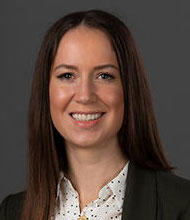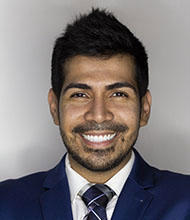Become the future of business with an MBA from the Costello College of Business at George Mason University.
A Costello Flex MBA equips you with diverse skills and a global perspective, preparing you to lead in the new era of business.
The Flex MBA program at the Costello College of Business at George Mason University offers an innovative curriculum that transcends traditional learning and delivers a dynamic educational experience crafted by the real-world insights of seasoned faculty and experienced peers. Located just outside Washington, D.C., the epicenter of business and policy, the Costello College of Business offers working professionals a competitive edge through a customizable MBA curriculum, in-person and online options, and a global immersive experience. The Costello Flex MBA program's unique approach to student outcomes supports industry transitions, network growth, and entrepreneurship. Equip yourself with essential data-driven decision-making and leadership skills for personal and career development, while investing in your future.

"Without my MBA, I wouldn’t have this job...the concepts that I was learning in project management are ones that I have been able to apply directly into my current role."
Lauren Lundberg, program manager at Northrop Grumman, MBA '22
Request More Information
To learn more about the Flex MBA program, submit the form below. To learn about the 100% online MBA program, click here.
Curriculum
On-campus classes are held in the evening. The program requires 48 credits: 30 credits of core courses, a three-credit global requirement, and 15 credits of elective courses. The Costello Flex MBA program operates on an eight-week module structure. Each in-person course meets one time per week.
Using the case method, so you spend your time thinking about real business problems, not just theory, our instructors regularly incorporate opportunities to connect business theory with business practice: role-playing, simulations, projects, and guest speakers are used to enhance learning from textbooks, lectures, and discussions.
Explore Degree Requirements
See a list of commonly offered courses and electives for the MBA program here. Please note that this list is intended to only provide a sample of courses offered.
The University Catalog is the authoritative source for information on program requirements and courses. Requirements may be different for earlier catalog years.
Sample Schedules
Discover how the Costello Flex MBA program can fit your life and career. Click here to see sample schedules.
The Global Residency: MBA 795 - Global Business Perspectives
Each component of Costello’s MBA program explores the role of management in the complex global economy and examines the risks and opportunities inherent in global commerce. Go even deeper and explore a new country and culture with the George Mason MBA Global Residency.
This three-credit course includes a week-long international study tour led by an MBA professor. You’ll meet business and government leaders, professors, and MBA students from other universities, and you’ll participate in seminars and visit local and/or multi-national companies. The global residency is offered at the completion of the core curriculum or program. This scheduling enables you to integrate what you have learned from your courses into the global experience. While venues change with the world economy, past residencies include Chile, China, Central Europe, and Western Europe. Some travel costs, such as lodging, some meals, and ground transportation, are included in your tuition. Students are responsible for airfare to and from the country.
Enhance Your Degree with a Certificate
Costello's business certificates are available as a component to your MBA degree. Through the required electives within the MBA curriculum, you can choose one of the four certificates below to complete as part of your MBA degree.
Digital Badges & the Costello College of Business Centers of Excellence
The Costello Flex MBA and Centers of Excellence have partnered to create Credly-verified Digital Badges in Government Contracting and Sustainable Entrepreneurship. These Digital Badges enhance professional abilities, connect students with employers, and can be added to resumes and LinkedIn profiles for credibility. In addition to the Badges, the Centers support the Costello Flex MBA program by providing experiential learning, research opportunities, and curriculum development, fostering valuable interactions among scholars, students, and industry leaders.
Meet Your Instructors
Our faculty members bring both theoretical and applied expertise to the classroom, and have an international reputation for their thought leadership in interdisciplinary focus areas such as ensuring global futures, the digital transformation of work, and entrepreneurship and innovation. Their work finds applications in industries such as government contracting, information technology, retail, real estate, consulting, and more, and they are often quoted both in the popular and business press.
See all MBA Faculty
What Our Alumni are Saying

"The [MBA] program has proven to be transformative, not only academically but also in fostering crucial connections. My Global Residency . . . led to a series of events where I secured a consultancy opportunity and created my own LLC in Washington, D.C. My success story underscores the program's commitment to networking, showcasing the practical impact and real opportunities it provides."
Guillermo Palencia, MBA ‘23

"I took what I learned from George Mason, both the soft and hard skills, and I’m able to apply it in my day-to-day interactions and my work. One of the best parts for me was the size of the classes. I was able to bond with my peers, and the professors were available for interaction."
Sree Kancherla, global director of sustainability at Kearney, MBA ‘22

"The Mason faculty is invested in your success . . . each of my instructors made themselves available to me, and they try to get to know you better as a person. In this environment, you are going to grow as a business leader."
Doug Chapman, vice president of operations at CoreSys Consulting Services, LLC, MBA ‘22 and 2022 MBA Outstanding Student of the Year
Frequently Asked Questions
If you have additional questions, call us at (703) 993-8006.
How much work experience do I need before I can apply?
Costello Flex MBA program applicants are required to have a minimum of two years of post-undergraduate work experience.
What does GMAT/GRE/EA test-optional mean?
Under our test-optional policy, applicants are not required to submit their GMAT/GRE/EA test scores or request a waiver. This means that our admissions committee will base their decision on an applicant's previous academic performance, personal statement, recommendations, and resume.
If you would like to submit a GMAT/GRE/EA test score with your application, we invite you to do so. Applicants are not penalized in the application review process for electing not to submit a test score. To learn more about the test options, please visit Standardized Testing.
If you elect to not submit your test scores:
In your graduate application, you will be asked “Would you like to submit your official GRE/GMAT/EA test scores to be considered as part of your admissions decision?”. Select “No”. The question will be under the “GRE/GMAT/EA Waiver Request” section.
Are there any situations in which it might be beneficial to submit a GMAT/GRE/EA test score?
Yes, while not required, a GMAT/GRE/EA test score may enhance your application package and provide evidence of your quantitative aptitude.
If you elect to submit your test scores:
In your graduate application, you will be asked “Would you like to submit your official GRE/GMAT/EA test scores to be considered as part of your admissions decision?”. Select “Yes”. The question will be under the “GRE/GMAT/EA Waiver Request” section. Your application portal will be updated to include the GMAT/GRE/EA test as a requirement.
To learn more about the test options, please visit Standardized Testing.
Is the Costello Flex MBA program STEM-designated?
No, the Costello Flex MBA is not a STEM-designated program. Graduating Costello Flex MBA students on an F-1 visa can be eligible for up to 12 months of Optional Practical Training (OPT). However, students can make their MBA into a STEM-designated program by pursuing a dual master’s degree with the MS in Business Analytics or the MS in Finance. With this STEM designation, F-1 students can extend their OPT period by up to 24 months or the equivalent amount of CPT. For information regarding individualized dual master’s degree programs of study, please contact the Graduate Admission Team.
Do I need an undergraduate business degree to be admitted?
No. Applicants come from a variety of backgrounds, but all applicants are required to hold a degree from an institution of higher education accredited by a George Mason-recognized U.S. institutional accrediting agency or international equivalent.
If you don't have a business undergraduate degree or background, this will not hurt your chances in the admissions process or your success in the program.
What's the difference between Mason's on-campus and online MBA programs?
The Costello College of Business offers both on-campus and online options for its MBA program.
While the delivery format is different, the course content, instructors, objectives, evaluation methods, and outcomes for both programs are identical.
Which program is right for you? Explore the differences:
| On-Campus Costello Flex MBA | Online MBA | |
|---|---|---|
| Best suited for: | Students who live or work in the Washington, D.C. metro area and want face-to-face interaction with faculty and classmates | Students who live outside the Washington, D.C. Metro area and do not want to relocate and/or students who require the flexibility of a fully online program |
| Location: | Arlington or Fairfax Campuses | Fully online |
| Class time: | Evenings | Asynchronous |
| Program start term: | Fall, Spring | Fall, Spring, or Summer |
| Program length: | As few as 20 months or as long as five years | 33 months (possible to complete in two years with accelerated option) |
Learn more about the MBA program's application requirements and tuition and financial aid.
When are classes offered?
On-campus Costello Flex MBA classes are in the evenings. Core classes are generally offered from 7:20 to 10 p.m.
Online MBA classes are offered in an online asynchronous format.
Can students work while attending classes?
Yes. The Costello Flex MBA program is designed to fit your career, educational aspirations, and lifestyle. It’s a perfect program for working professionals.
Where are Costello Flex MBA graduates employed?
Our graduates have found professional success at top companies such as:
- Capital One
- World Bank Group
- Hilton
- Marriot International
- Booz Allen Hamilton
- Deloitte
- Northrop Grumman
- CACI International Inc
- Freddie Mac
- Fannie Mae
- The Motley Fool
- General Dynamics Information Technology
- Leidos
- Wells Fargo
- Inova Health Systems
- Boeing
- Nestle
- Navy Federal Credit Union
Can I connect with current Costello Flex MBA students?
Upon admission, you will have the opportunity to connect with our student ambassadors to learn more about the Costello MBA student experience and schedule a class tour.
Is the Costello College of Business accredited?
Yes. The Costello College of Business is fully accredited by AACSB (Association to Advance Collegiate Schools of Business) International, and is one of only 189 schools in the world with business and accounting programs fully accredited by AACSB International.
In addition, the Costello College of Business is both a signatory and a champion of the PRME (Principles of Responsible Management Education), the United Nations’ initiative aimed at promoting responsibility and sustainability through business and management curricula.
What will I learn?
After earning your MBA from the Costello College of Business, you’ll understand:
- Collaborative Communication and Leadership
- Demonstrate teamwork skills to form and lead effective organizational teams
- Develop interpersonal and leadership skills to form, lead and work effectively within diverse organizations.
- Effectively utilize both written and verbal communication skills.
- Knowledge of Functional Business Disciplines:
- Identify and represent knowledge of all core functional areas of business and an ability to integrate them into a meaningful firm level perspective.
- Analytical Decision Making:
- Demonstrate the ability to analyze uncertain complex management situations using appropriate tools, techniques and information systems for decision-making.
- Contemporary Issues in Business:
- Exhibit knowledge of ethical decision making considerations, corporate social responsibility and sustainability practices.
- Identify relevant economic, political, and social factors that impact business conducted both within and across national boundaries.
News from the MBA Program
- July 18, 2025
- June 27, 2025
- May 12, 2025
- May 8, 2025
- February 20, 2025

